

Creative intellect as a marker for genetic predisposition to high anxiety conditions. By Charles Linden, CEO, The Linden Centers The fabric of modern emotional psychology stands on foundations created from research by William James and Carl Lange.
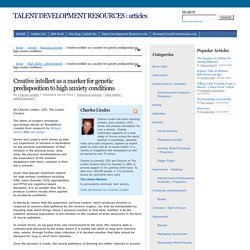
James and Lange’s work shows us that our experience of emotion is dependent on the physical manifestation of that emotion in the physical body; strip away the physical manifestations and the experience of the emotion disappears with them; emotion is then but a concept. Given that popular treatment options for high anxiety conditions including GAD, panic disorder, OCD, agoraphobia and PTSD are cognitive based therapies, it is no wonder they fail to produce curative results when applied to emotional conditions. In simple terms, as we pass from one environment to the next, this sensory data is collected and delivered to the brain, where it is sorted into short or long term memory silos, where, through further data collection, it is decided whether that data should be stamped for long or short term retention. [Photo added:] Theory of Positive Disintegration as a Model of Personality. Theory of Positive Disintegration as a Model of Personality Development for Exceptional Individuals By Elizabeth Mika [page 1/2] Gifted Minds in Search of a Theory For some time now, experts in the field of giftedness have been searching for and creating theoretical models of development, which could be applied to the gifted population.
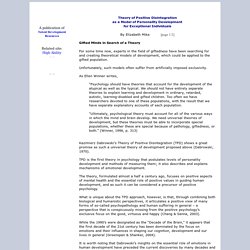
Gifted-Adults.com's Resources for Gifted, Talented & Creative Adults - Gifted, Talented, & Creative Adults. Discovering the gifted ex-child. Discovering the Gifted Ex-Child Abstract Most of the attention given to the gifted over the years has been devoted to gifted children, a population identified by unusual mental processing that sets them apart from the norms.
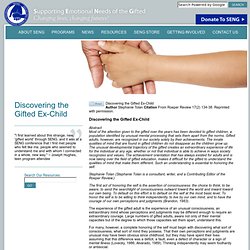
Gifted adults, however, are recognized in our society solely by their achievements. How to Charm Gifted Adults into Admitting Giftedness: Their Own and Somebody Else’s. The Loneliness of Being Misinformed about Giftedness In my current experience and view, the biggest “social issue of the gifted” is the painful misfit between implicit beliefs about giftedness by the non-gifted and the gifted alike and the actual or perceived reality of very many gifted adults.
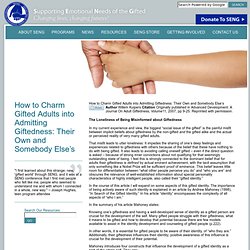
That misfit leads to utter loneliness: It impedes the sharing of one’s deep feelings and experiences related to giftedness with others because of the belief that these have nothing to do with being gifted. How to Charm Gifted Adults into Admitting Giftedness: Their Own and Somebody Else’s. Creativity across the life-span: A systems view. Csikszentmihalyi, M.
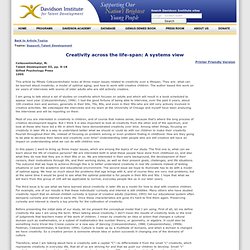
Talent Development III, pp. 9-18 Gifted Psychology Press 1995 This article by Mihaly Csikszentmihalyi looks at three major issues related to creativity over a lifespan. Paternal Influence on Gifted Males. Hammond, D.R., Hébert, T.P., & Pagnani, A.R.
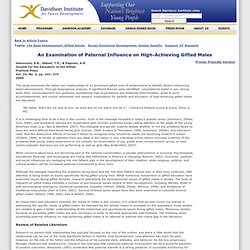
Journal for the Education of the Gifted Prufrock Press Vol. 33, No. 2, pp. 241–274 2009 This study examines the father-son relationships of 10 prominent gifted men of achievement to identify factors influencing talent development. Through biographical analysis, 6 significant themes were identified: unconditional belief in son, strong work ethic, encouragement and guidance, maintaining high expectations and fostering determination, pride in son’s accomplishments, and mutual admiration and respect. Implications for parents and educators of high-achieving gifted males are discussed. “My father didn’t tell me how to live; he lived and let me watch him do it.” It is a challenging time to be a boy in this country. While concerns about boys are becoming part of the national conversation, a parallel phenomenon is evolving. Review of Related Literature The late 1990s saw the publication of several books on parenting boys.
Selection of Subjects. Intellectual Giftedness. The Profoundly Gifted Adult. The intellectual and psychosocial nature of extreme giftedness. Powell, P.
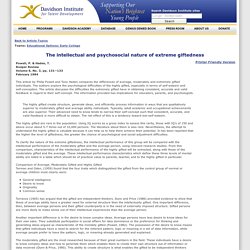
& Haden, T. Roeper Review Volume 6, No. 3, pp. 131--133 February 1984 This article by Philip Powell and Tony Haden compares the differences of average, moderately and extremely gifted individuals. The authors explore the psychological difficulties of the highly gifted, especially in terms of self-esteem and self-conception. The article discusses the difficulties the extremely gifted have in obtaining consistent, accurate and valid feedback in regard to their self-concept. The information provided has implications for educators, parents, and psychologists. The highly gifted create structure, generate ideas, and efficiently process information in ways that are qualitatively superior to moderately gifted and average ability individuals.
The highly gifted are rare in the population. General intelligence Desire to know Originality Common sense. Right Brain Smarts: Creative People’s Brains Function Differently. A new study has ended the controversy (or perhaps just stirred up more) by demonstrating that creative people do think in a fundamentally different way than everyone else.
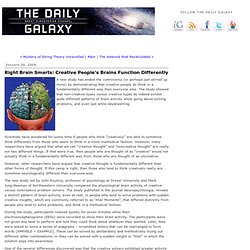
The study showed that non-creative types versus creative types do indeed exhibit quite different patterns of brain activity while going about solving problems, and even just while daydreaming. Scientists have wondered for some time if people who think “creatively” are able to somehow think differently from those who seem to think in a more methodical fashion. However, many researchers have argued that what we call “creative thought” and “noncreative thought” are really not two different things.
Upside Down Brilliance. 18 Things Highly Creative People Do Differently. This list has been expanded into the new book, “Wired to Create: Unravelling the Mysteries of the Creative Mind,” by Carolyn Gregoire and Scott Barry Kaufman. Creativity works in mysterious and often paradoxical ways. Creative thinking is a stable, defining characteristic in some personalities, but it may also change based on situation and context.
Inspiration and ideas often arise seemingly out of nowhere and then fail to show up when we most need them, and creative thinking requires complex cognition yet is completely distinct from the thinking process. Neuroscience paints a complicated picture of creativity. IQ ranges and real-life functioning. © Paul Cooijmans Introduction This is a list of I.Q. ranges with for each a brief description of typical functioning and other features.
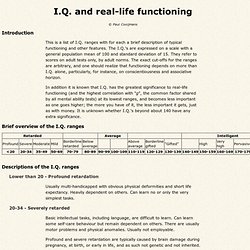
The I.Q.'s are expressed on a scale with a general population mean of 100 and standard deviation of 15. They refer to scores on adult tests only, by adult norms. GiftedProblems-4. GiftedProblems-5. J_E_G_Publication. Sage_encyclopedia_chapter_psychotherapy.